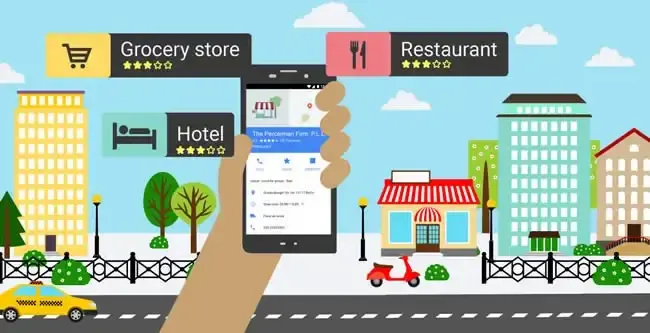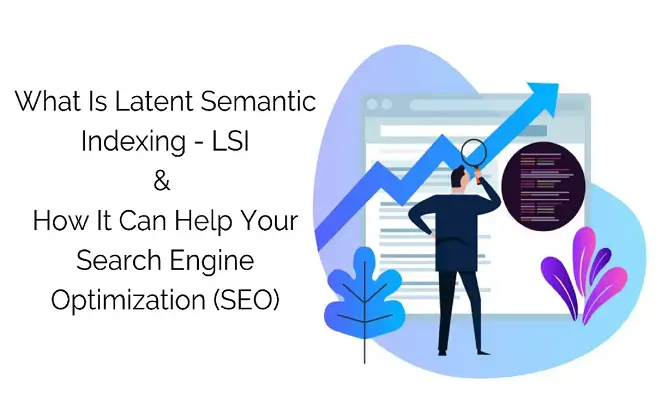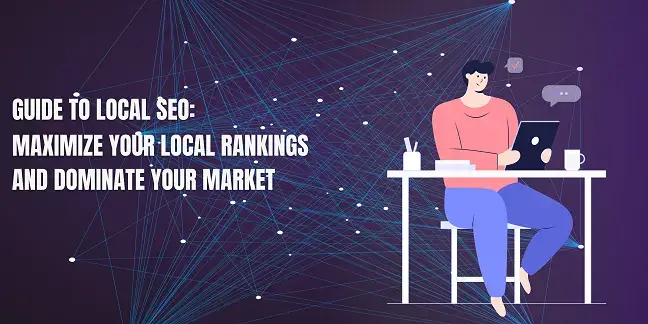
As it is a known fact that SEO is the process by which a website’s technical setup, content relevancy, and link popularity can be improved so that its pages are more easily found, relevant to user search queries, and popular with other users, and as a result, search engines rank them higher Which helps a business in the following ways:
- By improving traffic to the business website.
- By producing more leads.
- SEO also helps in building the credibility and trust of the visitors.
Table of Contents
But First, What is Local SEO?
Local SEO (Search Engine Optimization) is the optimization of your website or online presence to improve your visibility and ranking in local search results. This includes optimizing a number of elements, including:
- Website content
- On-page elements
- Google My Business profiles
- Local Citations
- Customer reviews and more
When you optimize all these it helps your business appear prominently in local searches related to your products and services. Local SEO aims to increase the visibility of your local business online, attracting more local customers and increasing customer visits to your physical location. This is especially important for businesses that rely on local customers, such as brick-and-mortar stores, restaurants, and hospitality businesses that operate in specific geographies.
But, if asked: What on earth is the difference between Local SEO vs SEO? Are they different or not related to each other?
Are you confused between SEO and Local SEO? Don’t Worry, we are here to help you with this.
Local SEO or local search engine optimization (Local SEO optimization) is a subset of search engine optimization by which you can make your business more visible on local search results on search engines.
While SEO is simply where it all starts. Local SEO isn’t separate from SEO and vice versa. They are all related deeply just we need to work with different strategies for On-Page, Off-Page & Technical SEO that create impact on both these .
SEO gets you found online, and Local SEO gets you found locally.
Local search engine optimization (SEO) is useful for any business that has a local presence or operates in a particular area. It can assist you expand your business if, while searching Google for any relevant keywords for your company, a map with three entries displays beneath it (a situation known as a “map pack”).
Hope we make it clear for you in some aspects . To explore more about Local SEO and its strategies continue your reading.
First we will see its three pillars or you can say it’s the base to start learning Local SEO Strategy
What are the three Pillars of Local SEO?
Three Pillars of Local SEO are Relevance, Proximity, Prominence. Let’s take a closer look at each pillar of local SEO.
Relevance
Relevance refers to how well your business matches a user’s search intent. To optimize local SEO relevance, businesses should focus on the following aspects:
- Keyword optimization: Conduct in-depth keyword research to identify relevant keywords related to your business or location. We use these keywords to optimize our website and online content to show relevance to search engines.
- Localized content: We create high-quality, localized content that meets your audience’s specific needs and interests. This may include blog posts, articles and landing pages with location-specific information.
- Google My Business: Optimize your Google My Business (GMB) profile by providing accurate and detailed information about your business. This includes company name, address, phone number (NAP), industry, and hours of operation.
Proximity:
Proximity means the physical proximity between your location and your company’s location. The main goal is to provide users with search results that are geographically relevant to their location. Consider the following points to optimize proximity:
- NAP Consistency: Ensure consistent and accurate NAP information across all online directories, citations and websites. This makes it easier for search engines to determine the location of your business
- Local Citation: Create citations in trusted online directories and platforms that list your business information. These estimates include his NAP details and should be consistent across platforms.
- Optimizations on localized pages: Optimize elements on your website pages such as meta tags, headers, content, and include location-specific keywords and information.
Prominence
Prominence is a company’s reputation and visibility on the Internet. Determined by factors such as customer reviews, online ratings, backlinks, and overall online presence. To raise awareness, consider the following:
- Online review: Encourage customers to leave reviews on platforms such as Google, Yelp, and other industry-specific review sites. Respond to positive and negative reviews to show engagement and build trust.
- Business Directory: Get listed in reputable business directories and reviewed platforms to increase your visibility and credibility online.
- Backlink: Build quality backlinks from reputable websites and local sources. You can do this through content marketing, guest blogging, and building relationships with local influencers and organizations.
- Social Signals: You can take advantage of social media platforms and interact with your followers. Social signals like likes, shares and comments can create brand awareness and help a lot to increase visibility
By focusing on the relevance, proximity, and visibility, businesses can enhance their local SEO efforts, increase their visibility in local search results, attract more relevant customers, and drive business growth. can promote.
Hope you can understand Why it’s important? and Why do we need to work on these three parameters? Once it’s clear for you , Now you can start building your Local SEO Strategy to make your business a well known brand.
How To Create Your Local SEO Strategy? Step By Step Guide
I hope you now have an understanding of how local SEO works. Moving forward, we can focus on local SEO strategies and use the points mentioned earlier to enhance visibility and drive traffic. This section offers a detailed guide on how to implement these strategies effectively?
The First step to start with is Keyword Research
Keyword research for local search
The Process begins with Keyword Research . To boost your ranking you need to focus on Local SEO Keywords. Here we have explained for you with examples and Local SEO tool you can use to do keyword research
Keyword research for local search involves identifying and analyzing keywords that are relevant to your business and have localized intent. Here’s a step-by-step guide for conducting keyword research for local search
Understand local intent
Focus on keywords that have a local intent and are relevant to a specific location or service area. Consider including location-specific terms, landmarks, or neighborhood names in your keyword research.
Use a local keyword research tool:
Find local keywords using keyword research tools like Google Keyword Planner, SEMrush or Moz’s Keyword Explorer. These tools can provide data on search volume, competition, and related terms specific to your target location.
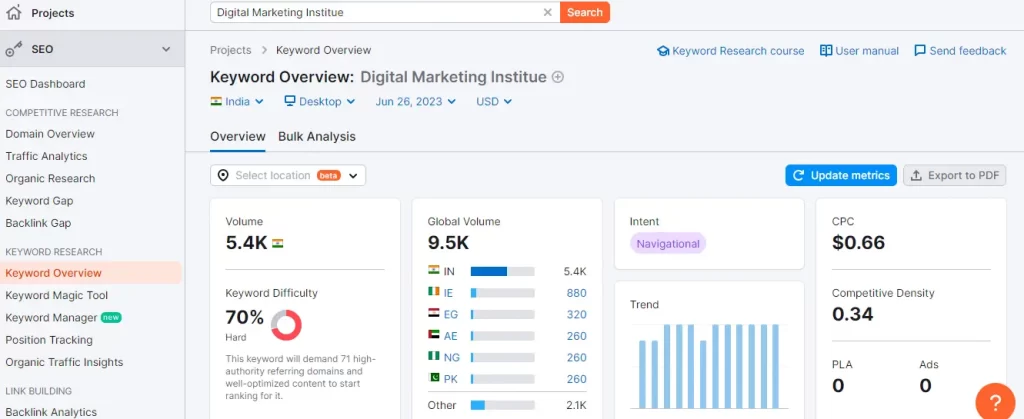
Here we have choose to work with Semrush to find the keywords overview. See the reference image below
You can choose any Keyword Research Tool of your own choice to get the idea of search volume, CPC, Competition and more insight . Even you can get the idea of related keyword that people use to search just like this
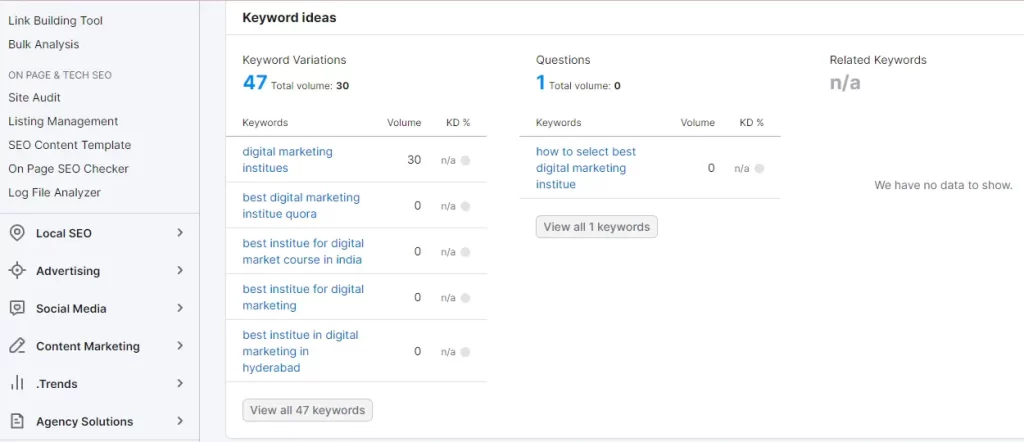
It’s not limited to that we need to analyze our competitor keywords also to find the potential opportunities to rank
Analyze your competitor’s keywords.
Research the keywords your local competitors are targeting. Identify opportunities for differentiation or find additional localized keywords you may have missed.
You can use Semrush Competitive Research Tool to find the competitor ranking keywords and more insights that will help you to align your research work for more better results.
No , it’s not the end . You need to find the long tail keywords also.
Long tail keywords
Include long-tail keywords in your research as they are more specific and have less competition. Long-tail keywords often reflect the specific needs and intentions of local searchers and can help you attract more targeted traffic.
For Example we have used Answer The Public to find . Check the image below
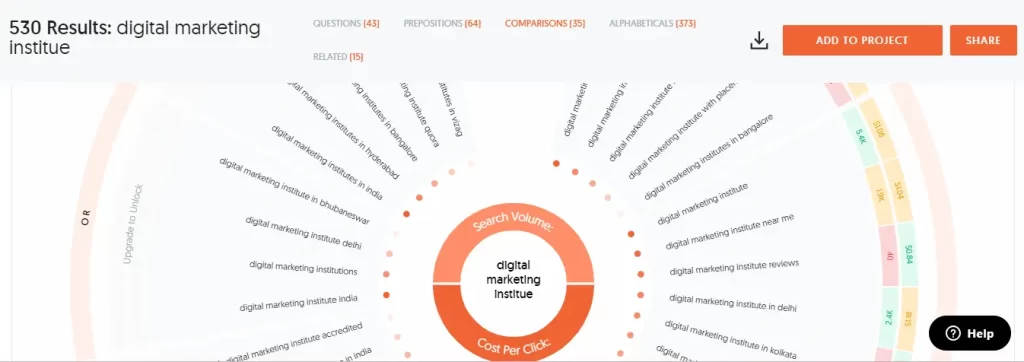
Its completely your choice to select the tool that works best for you. But the more you explore the more fine data you will get.
The last one to monitor your work means your keywords that you have selected to work with.
Monitoring and adjustment
Continuously monitor the performance of your local keywords of choice using analytics tools. Evaluate the rankings, traffic and conversions generated by these keywords and adjust your strategy as needed. Adjust and update your keyword list regularly to stay relevant and competitive in local search.
Great, you are set with your selected keywords . Now it’s time to give a boost by crafting a content
Localized content creation
Your First Hurdle is clear now you are one step closer to your goal. Haha ! We are not joking .
It’s true that choosing the right keyword is most important and you have done this job .
Moving ahead you have to focus on your content because it delivers your message to the target audience.
Create content that resonates with your local target audience. Blog posts, articles, and landing pages that are location-specific will create an impact on the local users based on their search intent.
Local Search Intent
Understanding local search intent is crucial for businesses that want to optimize their online presence for local business. By aligning their content and strategies with local search intent, businesses can attract highly targeted traffic and increase their chances of conversion
Here are some key aspects of local search intent that you have to keep in mind always.
Location-based queries: Local search intent typically includes location-specific keywords. For instance, a user may search for roofing services in “[city name]” or “best pizza near me”. These queries suggest that the user is searching for results related to their local area.
“Near me” searches: “Near me” has become increasingly popular, particularly on mobile devices. Search for a product or service and type “near me.” For example, “near me coffee shop near me” or “near me hardware stores near me” are examples of near me searches. These searches suggest that users are looking for businesses near their current location.
- Service or Product + Location: Users often combine specific products or services with their location in search queries. For instance, they might search for “plumber in [city name]” or “Italian restaurants in [neighborhood name].” This indicates their intent to find businesses that offer specific services or products within their local area.
Local search intent is one of the most important aspects of local SEO. Understanding and utilizing local search intent is essential for optimizing your website content, metadata, and local landing pages. By including relevant local keywords and location-specific information in your, businesses can improve their local search visibility and capture local intent users’ attention.
Google My Business Optimization
A Free tool to create a bridge between you and your customers. Start working on this wisely because it brings a lot for you if you do Google My Business SEO correctly.
Claim and optimize your Google My Business listing. NAP consistency by choosing the proper categories, adding photos, and gathering customer reviews.
Google’s Local Pack
Google’s Local Pack, also known as the “3-pack,” is a prominent feature in Google’s search engine results pages (SERPs) that displays a map and three local business listings relevant to a user’s search query
Here are some key characteristics and elements of Google’s Local Pack:
-
- Map Display: At the top of your search results, the Local Pack has a map showing the geographical area relevant to your search query.
- Business Listings: Below the map is a list of the businesses that Google considers to be most relevant to your search. Each listing typically has the following information: Name, Address, Phone Number (NAP), Website URL, Description
- Reviews and ratings: Google’s Local Pack includes customer reviews and ratings, so you can get a better understanding of each business’s quality and reputation. These reviews and ratings can help you make informed decisions about which businesses to buy from and compare them to others.
- Call to Action Buttons: Every business listing in Google Local Pack comes with a call to action button that allows you to take immediate action. You can call the business directly or get directions to the location of the business. These buttons make the user’s experience easier and faster.
- Additional Information: Sometimes, Google may show additional information about a business, such as its opening hours, favorite times, photos, or FAQs. This additional information is meant to give you more relevant information about the business, so you don’t have to go to its website to find out more.
- Expandable view: By clicking on the “More places” link, you can expand the pack to view a larger list of businesses that meet your search criteria.
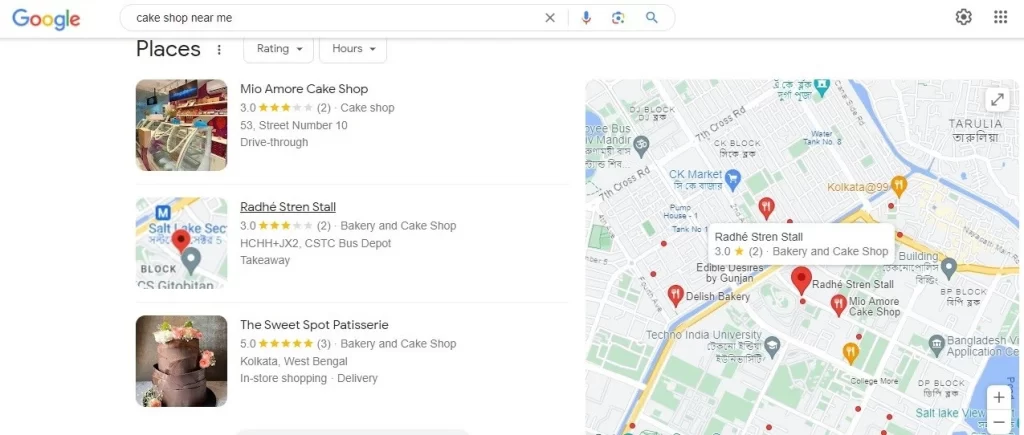
The Local Pack is a great opportunity for businesses because it gives you more exposure and a better chance of getting clicks and people to visit your site. To increase your chances of landing on the Local Pack list, you must optimize your online presence, such as your Google My Business page, local citations and reviews, and overall local SEO strategy.
Online citations and local listings
Exploring the significance of consistent NAP information across online directories, review sites, and industry-specific listings
A local citation is any reference to a business’s name, address, and telephone number on third-party websites, directory services, review sites, and other online directories. Local citations play an essential role in confirming a business’ presence, location, and trustworthiness.
What are the best practices for local citations and listings?
-
- Consistency: Your NAP information should be consistent across citations and listings.
- Accuracy: Make sure your information is accurate and up-to-date, including business address changes, phone numbers, and website URLs.
- Completeness: Make sure all available fields are filled out and include additional information such as hours of operation, links to websites, pictures, and descriptions.
- Reviews and Ratings: Your local citations and listings can benefit from reviews and ratings left by customers on relevant platforms. These reviews and ratings will not only help build your online reputation but will also help strengthen your local citations overall.
- Monitoring and Management: Monitor and manage your local citations and listings regularly. Make sure to update any changes as soon as possible. Responses to Customer Reviews and Inquiries
Local link building
Link building is an important aspect of local search engine optimization as it helps increase the authority and credibility of your company’s website in the eyes of search engines. Here are some link building strategies specific to local SEO.
Local directory and citation: Register your business with trusted local directories and citation sites such as his Yelp, Yellow Pages, and TripAdvisor. Make sure your NAP information (name, address, phone number) is consistent across all listings. These directory links provide valuable local signals to search engines.
Local Chambers of Commerce and Industry: Join local business associations and chambers of commerce that have online directories and membership lists. Many of these organizations link to their member websites and provide relevant and reliable local links.
Local Sponsorships and Partnerships: Sponsor local events, charities and organizations and request a link to her website on your behalf. This may include sponsoring local sports teams, community festivals, and charitable fundraising efforts. Local sponsorship links not only improve your ranking, but also increase brand awareness within your community.
Community Activities and Guest Blogs: Identify and work with local bloggers, influencers or industry experts in your area. Suggest guest blog posts and collaborate on mutually beneficial content. Guest blogs can provide valuable backlinks from relevant local sources.
Local media coverage: Feature the latest news about your company or industry to local press, online publications and bloggers. If your article gets coverage, chances are you’ll get backlinks to your site from credible local sources.
Partnering with local businesses: Identify complementary local businesses that are not direct competitors and explore opportunities for cross-promotion and co-marketing efforts. This may include links to each other’s websites or mentions of each other in blog posts or newsletters.
Customer reviews and ratings: Encourage satisfied customers to leave reviews and testimonials on your website or third-party review sites. Positive reviews can attract organic backlinks as other websites and blogs refer or link to your business based on the reviews.
All the above mentioned strategies will create a strong base for local seo if performed correctly . In addition to that there are few more Checklist on which you have to work for more better results
Have You Checked These Local SEO Checklists?
Once you start working with all the strategies mentioned above , you are closer to your Local SEO Checklist and remaining we have listed below to complete your work .
We will go through step by step
Website Optimization
Website optimization is crucial for SEO as it improves site performance, user experience, and search engine visibility, leading to higher organic rankings and increased traffic. It involves optimizing various elements such as page load speed, mobile responsiveness, meta tags, and site structure to ensure optimal performance and crawlability by search engines.
- Optimize your website’s meta tags (title, description) with local keywords.
- Include location-specific content on your website (service areas, localized landing pages, testimonials from local customers, etc.).
- Make sure your website is mobile-friendly and loads quickly.
Schema Markup
Schema markup is important in SEO as it helps search engines understand and interpret the content on a web page, leading to enhanced visibility and rich snippets in search results. It provides structured data that can improve click-through rates, provide more relevant information to users, and improve the overall visibility and credibility of a website in search engine results pages.
- Implement schema markup on your website to help search engines understand your business details, such as address, phone number, and business type.
Social Media and Online Engagement
Social media and online engagement play a significant role in SEO as they can drive traffic, increase brand visibility, and enhance website authority. Engaging with users and promoting valuable content on social media platforms can lead to more shares, backlinks, and improved search rankings. Active participation in online communities and discussions also helps build brand reputation and signals to search engines that the website is authoritative and relevant.
- Make sure you’re active on your preferred social media channels.
- Engage with your local audience by sharing valuable content, responding to comments, and participating in local conversations.
We have tried to make it clear for you the different aspects of Local SEO on which you need to work and monitor for maximum visibility, traffic, awareness and more .
But it’s still important for you to know its benefits so that you can analyze your work and improve your strategy that is affecting your performance in search result.
What are the Benefits of Local SEO?
There are many benefits of Local SEO and we have discussed each that help you to understand its importance in your business.
1.High positions for local queries
When Google is aware that a query contains keywords with a local purpose, it makes every effort to deliver the most accurate and relevant local results. Local results will always appear first while pushing the rest pages underneath.
2.Improved visibility in your niche
Your company’s visibility in a certain field will rise, which is one of the finest advantages local SEO can offer you. What it really means is that you may attract customers who are really interested in what you’re selling by optimizing your business information and content for local searches.
3.Increased relevant traffic
Finding the proper audience to target has never been easy. One advantage of local SEO is how much simpler the process is. If done right, you’ll start receiving the most relevant traffic you can only imagine. To start, you fill up your Google my business profile, add your company to as many local business directories as you can, and establish a local landing page for your website (if you have one, of course).
4.Trust and authority
It really gets difficult sometimes to trust a business that you are seeing for the first time and heard of before, here is where local SEO helps. Implementing a local optimization plan can boost your brand’s recognition and draw in more customers (both online and offline). This is an amazing method to demonstrate your specialized knowledge and impart the experience you’ve gained over the years working in the industry. When they perceive that you are knowledgeable in your field, they will have more confidence in you.
5.Strong local community outreach
One of the biggest advantages of local SEO is that it allows you to immerse your business in your community. When your brand is trusted, it’s easy to build trust (especially in the local area)..
6.Ability to create more effective marketing campaigns:
One of the biggest advantages of local SEO is that it makes marketing campaigns much simpler and more cost-effective. No matter what type of promotion you opt for, targeting a certain area will decrease the costs you might have spent because the required coverage is smaller. Local SEO benefits for small business owners. It’s much easier to find out what a specific small town wants when it comes to business propositions than it is to do it across the country.
7.Cheaper ads
Even 82%of mobile buyers choose a “near me” search when making a local purchase. Additionally, more than 90% of those who responded to the same study indicated they would click on the first set of results. It means that if you successfully manage your local SEO, your company will show up among the top results for a pertinent inquiry. By doing this, you may get high-quality organic traffic for nothing and avoid paying too much for PPC or other forms of advertising.
8.Appearance in Google 3 pack
The 3-Pack is used by Google to provide local search results. As the name implies, the search engine presents a local pack with three suggested options when a user is seeking local products, services, or destinations to visit in a certain area.
9.Increased number of repeat customers
Local listings will help you stand out from the crowd. The next time these people will be searching for the things you are able to provide them with, local SEO will ensure you’ve popped up again. One of the biggest advantages of local SEO is that it allows you to build a loyal customer base much faster. Once a customer trusts you, they’ll keep buying from you for many years to come, and it’s your responsibility not to spoil their experience.
Hope Now you have get an idea Why is Local SEO important for your business? Yes if you want to grab the attention of your customers first then you need to work on local SEO Still if you have any doubt or your strategies are not working properly . Whether you are students or a business owner who want to learn Local SEO to improve their business .Anyone can Join and learn Local SEO Course
Tools For Local SEO
There are several SEO tools available to assist with local SEO efforts. Here are some notable Local SEO tools we have mentioned :
- Google My Business: A crucial tool for local SEO, Google My Business allows businesses to manage their online presence, update information, and engage with customers. It helps optimize local search visibility and enables users to leave reviews.
- Moz Local: Moz Local helps businesses manage their local listings across multiple platforms. It ensures consistency in business information and enhances local search visibility by submitting accurate data to directories, search engines, and online platforms.
- BrightLocal: BrightLocal offers a range of tools for local SEO, including local citation building, reputation management, rank tracking, and review monitoring. It provides insights and data to improve local search performance.
- Yext: Yext offers a platform to manage business information across various directories and platforms. It helps maintain consistency, correct inaccuracies, and enhance local search visibility.
- SEMrush: While not exclusively focused on local SEO, SEMrush provides valuable insights for optimizing local search. It offers keyword research, competitive analysis, and local SEO audit features to improve local search rankings.
- Whitespark: Whitespark specializes in local citation building and offers tools for finding and managing local citations. It helps improve local search visibility and builds consistent business listings across directories.
These tools assist businesses in managing their SEO efforts, optimizing their online presence, and improving their visibility in local search results.
Not only these there are many more you need to completely optimize your Local SEO strategy. We have listed a few to visualize how you can start your work.
Conclusion
If you have read the complete blog , you are now ready to start working on Local SEO for your business.
Local SEO not only helps you appear in relevant local search results but also enhances your credibility and trustworthiness among potential customers. It improves the user experience, provides valuable customer insights, and offers a cost-effective marketing approach. With the increasing reliance on online searches for local information, investing in local SEO is a smart move for businesses looking to thrive in their local market and drive both online and offline success
- PPC Marketing – Target the Right People at the Right Time - March 6, 2024
- The Income Friendly Guide to the Best SEO Training Institute - March 6, 2024
- Fundamentals of internet-based marketing: Internet Marketing - March 4, 2024
Frequently Asked Questions
Local SEO, or Local Search Engine Optimization, is the process of optimizing a website or online presence to enhance visibility and rankings in local search results. It involves strategies to improve a business’s online presence for local customers.
While traditional SEO focuses on improving a website’s overall visibility on a broader scale, Local SEO specifically targets local search results. It aims to make a business more visible to local customers searching for products or services in a specific geographic area.
Local SEO is essential for businesses that rely on local customers, such as brick-and-mortar stores, restaurants, and service providers. It helps improve online visibility, attract local customers, increase foot traffic, and enhance overall business growth.
The three pillars of Local SEO are Relevance, Proximity, and Prominence. Relevance refers to how well a business matches a user’s search intent, Proximity is the physical distance between the user and the business, and Prominence is the business’s online reputation and visibility.
Businesses can optimize for relevance by conducting keyword research, creating localized content, and optimizing their Google My Business profile with accurate and detailed information.
Local SEO makes marketing campaigns more effective and cost-efficient by targeting a specific geographic area. It reduces costs by narrowing the required coverage and allows businesses to tailor their promotions to the local audience.
Google’s Local Pack is a feature that displays a map and three local business listings relevant to a user’s search query. It is important for businesses as it provides increased exposure and a better chance of getting clicks and visits from potential customers.
Online citations and local listings confirm a business’s presence, location, and trustworthiness. Consistent NAP information across directories and review sites helps strengthen local citations, contributing to improved Local SEO.
Some notable Local SEO tools include Google My Business, Moz Local, BrightLocal, Yext, SEMrush, and Whitespark. These tools assist businesses in managing their local listings, optimizing online presence, and improving visibility in local search results.
The timeline for seeing results from Local SEO efforts can vary depending on several factors, including the competitiveness of the local market, the effectiveness of implemented strategies, and the current online presence of the business. Generally, businesses may start to notice improvements within a few weeks to a few months.
